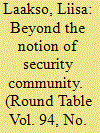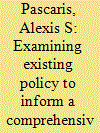| Srl | Item |
| 1 |
ID:
073205


|
|
|
| 2 |
ID:
181780


|
|
|
|
|
| Summary/Abstract |
Advances in solar photovoltaic applications demonstrate the viability of combining agriculture and solar energy production in a system known as agrivoltaics. Because scarce consideration has been given to the socio-political context of development, this study applies Legal Framework Analysis to identify barriers and opportunities for a comprehensive legal infrastructure to enable agrivoltaics in the U.S. The State of Massachusetts is used as a case study to understand what elements of their regulatory regime contribute to their novel agrivoltaic policy program, while also considering the surrounding federal and local government dynamics in which this state program is embedded. Based on the analysis results, a comprehensive legal framework for agrivoltaics should arguably include a combination of federal and state energy financing mechanisms coupled with favorable state and local land use policies. Specifically, a state-level feed-in tariff and local government allowances for mixed land use between solar and agriculture will be the key features of an enabling legal framework. The results demonstrate that multi-level, multi-sector policy integration is imperative for advancing agrivoltaics and that strategic measures to align solar energy and agricultural land use regimes can catalyze the diffusion of this promising technology in the U.S.
|
|
|
|
|
|
|
|
|
|
|
|
|
|
|
|
| 3 |
ID:
192723


|
|
|
|
|
| Summary/Abstract |
The floating photovoltaic (FPV) system is being promoted in Taiwan to help transition towards zero nuclear energy production. One plan involved installation on 300 artificial irrigation reservoirs in Taoyuan. It was stalled several times and eventually stopped. Through semi-structured group interviews, observation, transcribed audio-taped meetings, and document analysis, a stakeholder network was constructed to understand the institutional arrangement and find the root causes of the problem. The study investigated the network of resource users and managers including solar power companies, central energy provider, pond owners, informal users, environmental groups and government agencies. Apart from inadequate stakeholder participation, it was found that the problem was exacerbated by the private open-access arrangement and the complex governance structure, which made property rights unclear. These considerations highlight the importance of transaction costs associated with social dynamics and multilevel governance, which must be considered in feasibility studies. This paper also argues that initiatives viewed as a failure can nevertheless pave the way for future renewable energy projects by legally clarifying property rights and offering test sites for an objective FPV cost-benefit assessment, which can inform analytic-deliberative discourse for exploring potential compromise solutions. The lessons here can inform similar projects abroad, especially in land-scarce water-rich territories.
|
|
|
|
|
|
|
|
|
|
|
|
|
|
|
|